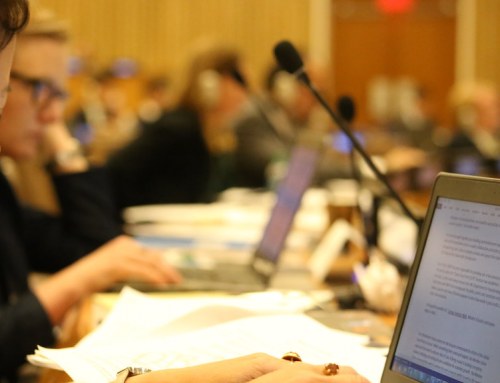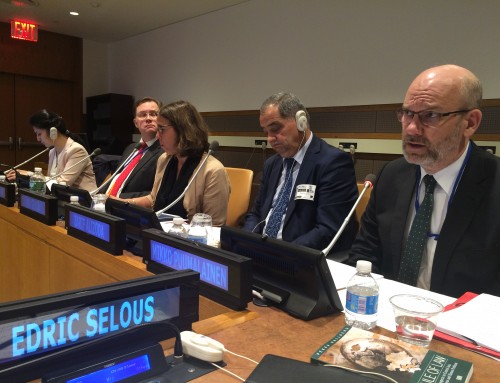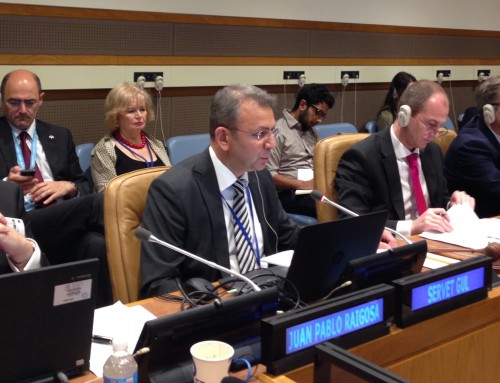On 4 October 2016, the Permanent Missions of Finland, Liberia and Nepal to the United Nations, UN Women and the Rule of Law Unit on behalf of the UN Rule of Law Coordination and Resource Group hosted an event entitled, “Women’s Access to Justice: A Transformational Approach.” The event was attended by approximately 80 representatives of Member States, international organizations, UN entities and members of civil society.
Speakers shared national experiences to enhance women’s access to justice and discussed the broad range of measures related to guaranteeing full realisation of human rights of women and girls. They emphasized the importance of women’s equal participation in decision-making, and in all sectors of society, the effect of discrimination in law and in practice, and the urgent need to eliminate all types of violence against women and girls. Multi-sectoral action plans on gender equality, on combatting sexual- and gender-based violence, and on women, peace and security, accompanied by clear timelines and budgets, were identified as a good practice. Efforts to support women’s access to justice post-conflict, including through the Justice Rapid Response, were also raised. There was an agreement that access to justice is about more than prosecuting crimes, it is about empowerment of women and addressing and the underlying gender inequalities present in all societies.
Summary of discussion
The event opened with brief remarks from Mr. Edric Selous, Director of the Rule of Law Unit in the Executive Office of the Secretary-General. Mr. Selous emphasized the timeliness of the event, taking place in preparation of the 6th Committee’s debate on practical measures on access to justice for all, including the poorest and most vulnerable. He reiterated the importance of sharing national knowledge and experiences, including to support implementation of the 2030 Agenda for Sustainable Development. The 2030 Agenda includes several goals targets critical to access to justice and to gender equality. Mr. Selous also noted that this event provided an opportunity to follow up on the implementation of the pledges made during the 2012 high-level event. On that occasion several Member States and international organizations made pledges to enhance women’s access to justice; pledges can be found in an online pledging database.
H.E. Ambassador Marja Lehto, Senior Expert of the Finnish Ministry for Foreign Affairs, and Chair of the Executive Board of Justice Rapid Response discussed access to justice for women in Finland. Despite a long tradition of gender equality in Finland, violence against women continues to persist, as was also shown by a survey conducted by the European Agency for Fundamental Rights in 2014.In this context, Ambassador Lehto described several significant activities that Finland is undertaking to prevent, and provide redress for violence against women. For example, Finland is working to establish an effective mechanism to coordinate national activities to combat violence against women, as required by the Istanbul Convention. Ambassador Lehto also spoke about Finland’s support to the international organization Justice Rapid Response, which operates a roster of sexual and gender-based violence (SGBV) justice experts, jointly with UN Women. Experts from the roster are rapidly deployed to national and international accountability mechanisms, to bolster their capacity to investigate and prosecute conflict-related SGBV. Ambassador Lehto closed her remarks with a reminder that the upcoming Security Council open debate on Women, Peace and Security provides an important opportunity for Member States to reiterate their commitments to implementing resolution 1325 (2000), including on women’s access to justice post-conflict.
H.E. Ambassador Lewis G. Brown, II, Permanent Representative of Liberia to the United Nations, described the context in Liberia for women’s access to justice, noting that Liberia is ranked as one of the countries in which governance standards have improved the most in the last decade. However, significant gaps remain in ensuring access to justice for all. Impediments include the lack of women’s political participation at the local level and the stigma attached to sexual violence, particularly among young girls. Ambassador Brown also described the significant work that Liberia is doing to overcome these challenges. These include the implementation of the country’s national action plan (NAP) on UN Security Council resolution 1325, which has played an integral role in ensuring that women participate in the national security sector and in national decision-making; the creation of a gender focal point in each government agency, to ensure that gender is mainstreamed across all programmes; and a joint programme with UN Women, to strengthen the entire formal justice sector and its response to SGBV. As an example of the results of these and other efforts to expand women’s access to justice, Ambassador Brown shared that Circuit Court E has increased the number of indictments for rape from 9 during its 2014 term, to 121 during its 2015 term.
Mr. Sudhir Bhattarai Under-Secretary and Director, United Nations, Other International Organisations and International Law Division, Ministry of Foreign Affairs of Nepal, described his country’s long struggle for inclusive democracy, and its ongoing work to improve women’s access to justice. Nepal has recently adopted a new constitution, which includes provisions relating to pluralism, rule of law, gender equality, and social and economic rights. Nepal is also implementing a national action plan on UN Security Council resolutions 1325 and 1820, which promotes women’s participation in post-conflict reconstruction. However, significant obstacles remain to ensuring women’s access to justice, including lack of financial resources for legal assistance, family honour and taboos which prevent victims of gender-based violence from reporting and seeking assistance, and a lack of knowledge of the available legal remedies. To address these challenges, Mr. Bhattarai pointed to the importance of developing and implementing a gender justice framework and anti-discrimination laws, strengthening free legal assistance, enhancing the protection available to victims after reporting, and ensuring public education on legal remedies for SGBV.
Ms. Purna Sen, Director, Policy Division, UN Women, highlighted recent policy developments and key themes from the panel discussion. She reminded the audience that, while no country provides a full safe haven for women from violence, all countries have committed to eliminate violence against women by 2030. The human rights framework on women’s access to justice, including the CEDAW Committee’s general recommendations 30 and 33, must be central to State and UN efforts to ensure universal access to justice. Access to justice must be about more than prosecuting crimes; justice must also empower women, and transform underlying gender inequalities which render women vulnerable to violence.
In a discussion with the audience, a representative of the International Development Law Organization (IDLO) provided an update on a pledge made in 2012, to undertake a global survey of the role of women in justice sector institutions and to analyze the legal barriers to women’s access to justice, and shared IDLO’s 2014 report, Out of the Shadows, On to the Bench: Women in Afghanistan’s Justice Sector. A representative of the Mission of Brazil to the United Nations also shared updates on women’s access to justice in his country, and reiterated that rule of law is not only about creating standards of behavior—it is about promoting inclusion and engagement.




